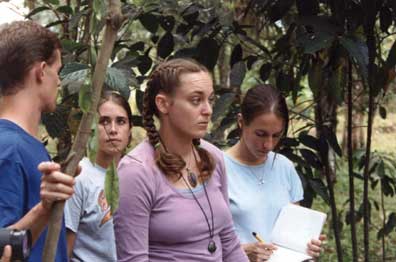
Leave your comments on the series below.
Read comments by RPCVs here, here and here.

Quote:Provided further, That the Director of the Peace Corps may make appointments or assignments, or extend current appointments or assignments, to permit United States citizens to serve for periods in excess of 5 years in the case of individuals whose appointment or assignment, such as regional safety security officers and employees within the Office of the Inspector General, involves the safety of Peace Corps volunteers:
Provided further, That the Director of the Peace Corps may make such appointments or assignments notwithstanding the provisions of section 7 of the Peace Corps Act limiting the length of an appointment or assignment, the circumstances under which such an appointment or assignment may exceed 5 years, and the percentage of appointments or assignments that can be made in excess of 5 years.


| By Andrew W. Maverick (ip68-105-12-39.br.no.cox.net - 68.105.12.39) on Wednesday, June 30, 2004 - 10:46 pm: Edit Post |
I don't see why we need any of the exemptions.
If good safety and security people are hard to find, then presumably that is true across the federal government. So if Peace Corps safety/security people are limited to 5 years there, then their next job may be at Treasury, or working for Congress or a federal court, or working in safety/security in private industry. Conversely, if a safety/security person in the US is looking for something different, then he/she may be interested in combining the profession with international service via a Peace Corps safety/security position.
Regardless of 9/11, safety/security personnel do not need special status.
| By Dan Hatch (proxy1.hawaii.rr.com - 24.25.227.132) on Thursday, July 01, 2004 - 3:13 am: Edit Post |
One of the great features of the Peace Corps is that in its structure it is relatively apolitical. When a movement gets institutionalized, the purpose should be to perpetuate the movement, not the institution. The five year rule is a vital part of maintianing the movement and keeping it relatively apolitical. Therefore the five year plan is essential to the Peace Corps viatlity and survival. Dan Hatch, RPVC Fiji I ('68 & '69)
| By Sueko Kumagai (fw.cns.gov - 204.124.231.11) on Thursday, July 01, 2004 - 8:47 am: Edit Post |
I do not support these exemptions. As a former PC staff member, I experienced both the benefits and the challenges of the 5 year limit, and in my opinion the benefits greatly outweigh any drawbacks. The ability to extend staff tours up to 8 1/2 years in certain cases is sufficient, even in the area of safety and security, to ensure continuity while maintaining Peace Corps' unique "in, up and out" opportunities and its institutional vitality.--Sueko Kumagai, RPCV Armenia 1 (92-94), PC Staff 1996-2001
| By Lew Mermelstein (lmermelstein1.arc.nasa.gov - 143.232.148.77) on Thursday, July 01, 2004 - 12:17 pm: Edit Post |
Five Year Rule Exemption
I've always felt the Five Year Rule was there to protect PCVs from becoming stuck 'in-country' and not wanting to return to the USA. I saw examples in Ethiopia in the 70s of PCVs absorbed in their new home, reluctant to give-up their new friends, simpler lives, and unwilling to return to the hustle and bustle of their old lives.
For whatever reason it exists, I support the Five Year Rule.
Lew Mermelstein
Ethiopia 70-73
| By r.j.stoll, Armenia 5 (cache-mtc-aa07.proxy.aol.com - 64.12.116.11) on Monday, July 05, 2004 - 7:27 am: Edit Post |
The 5 year limit should be maintained - as stated ... those that do not have the limit will dominate and these usually are just the ones that should be replaced ... as they will eliminate all those who challenge their dominence ... not those who are not doing the mission ... their mission will be to keep thier power - not to do the job.
| By battuta (158.232.86.214) on Friday, July 16, 2004 - 4:02 am: Edit Post |
Whether nor not the five-year rule should be changed is a matter of debate. As it is there is certainly what I would call abuse in the system. With extensions someone can work up to 8 1/2 years as PC staff, then an equal amount as a consultant to PC, then come back for more. I know of people who have worked in this manner for several decades with PC. Besides serving 3 tours as a PCV, I also worked as PC staff in DC, so I have seem the recyling of PC staff.
But what I don't think is right is Hugh Pickens, as editor of this site, sending his comments to Capitol Hill and implying he represents more than 100,000 RPCVs. Though he states that this amounts reads his site, he makes it sounds as if he speaks for all of us. I don't remember a vote on this issue before he made this statement. I think that is very unfair of him.
| By Joanne Marie Roll (joey) (cache-dtc-aa07.proxy.aol.com - 205.188.116.11) on Monday, July 19, 2004 - 11:39 am: Edit Post |
I wish that Peace Corps were a public corporation and thus insulated from partisan politics. But it is not, it is a creature of the White House and top employment, all too often, is a reward for loyalty to the party, not service to the country.
I wish that successful service as a PCV were an absolute requisite for any employment with Peace Corps. But, it is not.
I wish that there were an accurate, accessible data base which would record how each volunteer's experience with safety and security over the last forty years, but there is not.
Does changing the five year rule make up for any of this. No.
But, it may increase staff stability in the area most critical to the safety of the currently serving volunteer. And, this may lead to greater safety for the serving volunteer. None of the other comments address this real issue: Safety of serving volunteer. After all, peace corps staff is not in any great personal danger.
Such a change in the bureacracy may contribute to the "tail waging the dog" and the transformation from the status of being a Peace Corps Volunteer to being just a Volunteer with the Peace Corps agency. What has changed is the global environment in ways that we many not know and may not be an appropriate topic for speculation.
Finally, about the lack of an "institutional memory", I think all of us RPCVs must take responsibility. We should have insisted on an accurate record of our tours and our work. We settled instead for recruiting propaganda with all the anguish airbrushed out.
If there were an accurate, accessible record, we could answer these kinds of questions:
1) Women volunteers training for Brazil (#5/#6) were taught self defense techniques. Was that successful?
2) What was the cultural response (which would vary by time and country) when women were assigned alone?
3) When volunteers were integrated into their communities and the communities became targets for policitical violence, under what conditions was the need to protect the volunteers an extra burden for the communities? In my own experience, when guerrillas were in the area, community members were very fearful about peace corps presence. Nuns asked us not to come to the convent and a dear neighbor volunteered to come to our aid; but it was incredibly stressful for HCNs.
Safety and security issues vary trememdously based on the political climate, the culture and the times - not just the personal efforts of the serving volunteer. Because I could ride a bus solita all over the Pacific coast of South America or even hitchhike in my community doesn't mean a serving volunteer in the Mid East should be expected to do the same, today
The first priorty has to be the serving volunteer, today. Thank you.